Here are the beginnings of my notes on the Great Powers of the Falkenstein World. At the moment, it's a little image heavy and information light, but I'm working on it.
The eventual goal is to have some pages containing some more in depth information, story ideas and links on all these nations. Obviously, this will involve a lot of work, so I will be adding to it fairly slowly. At the moment, there are some capsule summaries and pictures of the national flag and leader of all the countries mentioned.
All of the flags on this page (except for California) come from the FOTW Flags Of The World website, a site I cannot recomend too highly to those interested in either modern or historical flags. The images of flags on this page were created by Jaume Ollé (Prussia, Bavaria), António Martins (Britain, Russia, Japan), Zeljko Heimer (France, Turkey), Giuseppe Bottasini (Austria-Hungary), Mario Fabretto (China), Rick Wyatt (USA), Mark Sensen (Chile) and Simon J. Frame & Joseph McMillan (Brazil). The Californian Empire flag is from a Californian flag I took from another site (though I cannot, alas, remember which) and modified myself.
| European Powers | ||
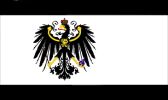 The Kingdom of Prussia | The Prussians are the villains of the Falkenstein world; or rather the Prussian government is the villain. Prussia is ruled by King Wilhelm, but Otto von Bismarck, the "Iron Chancellor", is the driving force behind Prussian policy. An ally to the Unseelie Fairies, Bismarck ultimately wants Prussia to rule the world. In the short term, he wants to unify the various German states (except for Austria). His main obstacle here is the strong independant south German kingdom of Bavaria. The Prussian military (arguably the finest in Europe) has been augmented in recent years by steam zeppelins and -- more importanty -- the terrible land fortresses; giant steam ironclads on tracks. Prussia has few colonies; a few in Africa and the Pacific. Prussian industry is second only to Britain's. They have fewer factories, but those one they have are far more modern. | 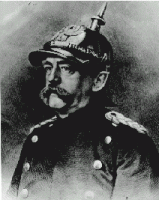 Chancellor Bismark of Prussia |
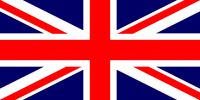 The United Kingdom of Great Britain and Ireland |
Britain has the largest colonial empire in the world, and is arguably the wealthiest nation in the world as a result. Though at the forefront technology during the early years of the industrial revolution, Britain's factories are aging now, and Britain is having a difficult time in keeping up with some her competitors. Britain has long maintained a policy of allying herself with the second most powerful nation on continental Europe; at the moment this is Prussia, France still having the edge. Britain's army is powerful and disciplined, but mostly stationed in the colonies. Britain's Royal Navy, is the largest in the world; in fact it is as large as the second and third largest navies put together. This, combined with the power of the ultra-modern turbine dreadnoughts, makes the British nigh invincible at sea. Britain is ruled by Queen Victoria, though the government is currently run by her very able Prime Minister -- Benjamin Disraeli, Lord Beaconsfield -- who follows a program of imperial expansion. |  Queen Victoria of Britain |
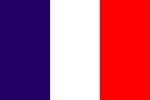 The Empire of the French |
France is the cultural centre of Europe, and has been for centuries. Parisian fashions in clothing, art and cuisine are aped across Europe. French literature is read in a dozen languages, and French art (and reproductions thereof) is universally popular. Napoleon III is a complex figure, who has done much good, yet also made huge mistakes during his reign. In the real world, by 1875 the Franco-Prussian War had unseated Napoleon III, but in Falkenstein, that has yet to occur- if it ever does at all. France's overseas empire, while smaller than Britain's, is still quite respectable. French industry is also not at the leading edge, but a large trade in luxury goods (such as wine, cheese, clothing and so on) keeps France almost as wealthy as her neighbour across the channel. The French army is disciplined and powerful, and generally more successful than the diplomacy that they serve. France's most significant military achievement of recent years has been the construction of giant canons around her borders. These 'Verne Guns' (named after French Science Minister Dr. Jules Verne) have thus far kept the Prussian armies at bay. | 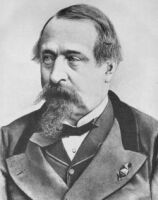 Napoleon III, Emperor of the French |
 The Kindom of Baveria |
The Kingdom of Bavaria (refered to throughout the Falkenstein books as Bayern, it's German name) is something of a wild card in Falkenstein Europe. In the real world, Prussia defeated the notoriously insane King Ludwig II of Bavaria, along with the Austrians and other German states in the Seven Weeks War, before making Bavaria part of the German Empire following the Franco-Prussian War. In the Falkenstein world, King Ludwig recieved a great deal of assistance; from the Seelie Fairies, from the Bavarian Illuminati, from the dragons, from the dwarves and from Thomas Olam, a man who went from our world to Castle Falkenstein. The upshot was that the Bavarians ended up with a fleet of magical airships, with which they were able to win the Seven Weeks War. The Bavarian Aeronavy remains a potent force in European affairs. Bavaria is also the home of Castle Falkenstein itself, a giant fairytale castle magically built by the Seelie Fairy King Auberon, on the same spot that Neuschwanstein Castle occupies in our world. |
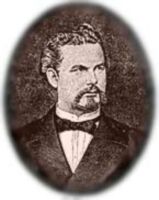 King Ludwig II of Baveria |
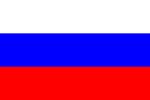 The Russian Empire |
The sprawling, backwards Russian Empire stretches from Europe to North America. Currently, they are rapidly expanding south through central Asia, though their advance is contested by the splendid horsemen of the region. As a colonial power, Russia has been remarkably successful; do not forget that in our world, the regions conquered by Russia remained under Russian control until the 1990s, long after the other European powers had lost or given up their colonies. On the other hand, Russia is socially and technologically far behind Western Europe. Russia is a feudal autocracy in which serfdom was only eliminated in the 1850s. There is little industry and few railroads. Since the days of Peter the Great, Russia has been trying to reach the same level of power and prestige as the Western European Powers, with highly variable success. In the Falkenstein World (or at least in my version of it), things have been different. The discovery of gold, oil and coal in the distant province of Russian North America (ie, Alaska) has breathed new life into the ailing Russian economy, allowing an increased rate of industrialisation without having take out foreign loans. But will Alaskan gold help Russia, or merely increase tensions in the North Pacific? | 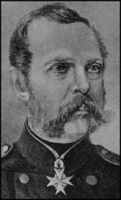 Alexander II, Czar of All the Russias |
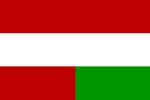 The Austrian-Hungarian Empire |
The Austrian Empire and it's successor the Austrian-Hungarian Empire were pretty much doomed from the start. Essentially, these Empires were an attempt to create a modern nation-state out of the remains of the feudal possessions of the Hapsburg family. Hungarian demands for independence lead to the compromise, whereby the Austrian Empire became the Austrian-Hungarian Empire, with the Kingdom of Hungary as a seperate state within the Empire. The national demands of the Balkan slavs have yet to become a major political issue, but as we know, they will become a significant factor in the twentieth century. The Austrian military- once the finest in Eastern Europe- is not considered very impressive, nowadays. Their most effective weapons are lightning-firing cannons, though they have precious few of those. In our world, Austria was defeated in the Seven Weeks War, and was never an active influence in the broader politics of Germany after that. Austria is mildly (but pleasantly) decadent, resting on the laurels of former glories. Emperor Franz Ferdinand- a dull, unimaginative and conservative gentleman- has ruled since 1848, and is likely to keep on doing so for years to come. | 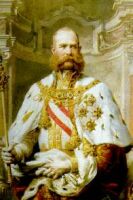 Emperor Franz-Ferdinand of Austria-Hungary |
| Asian and Middle Eastern Powers | ||
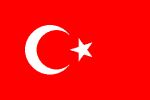 The Ottoman Empire |
At it's height, the Ottoman Empire stretched from the Persian Gulf to the Adriatic Sea; from Budapest to the Nile and all across North Africa. That was several centuries ago. Napoleon's conquest of Egypt demonstrated the military vulnerability of the Ottomans, and the Empire has been losing ground ever since. Noth Africa is now gone altogether, and Turkey's European possessions have been gradually lost to nationalist movements and the Russians and Austrians since the end of the Napoleonic Wars. In addition to the rapid loss of territory, Turkey looks set for a face off between the demands for constitutional rule, and the traditional authority of the Sultan. | 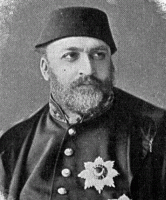 Sultan Abdul Aziz of the Ottoman Empire |
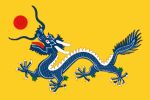 The Empire of China | In ancient times, seven empires were founded in Asia by dragons, the largest being China. The Chinese Empire has had it's ups and downs over the millenia, but the nineteenth century has been particularly bad for the country. The social and commercial isolation of China has been rocked by European commercial expansion- backed up by European cannons and bayonets. The Opium Wars made it very clear that China could not resist the outside world by main force, while the Taiping Rebellion showed that the Empire could not depend on the support of it's citizens. The death of the last of the Dragon Emperors left his human wife -- the redoubtable Dowager Empress Tzu-Hsi -- in de-facto control of the country. Whether she will be able to retain her power in the face of Western imperialism and growing local nationalism remains to be seen. | 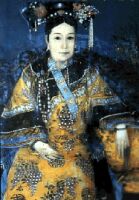 Empress Tzu-Hsi of China |
 The Japanese Empire | There are only a few details given in the sourcebooks on Falkenstein Japan, so it is necessary to extrapolate a bit. At the beginning of the 19th century, Japan was geographically, socially and economically isolated. Notionally ruled by a Dragon Emperor; in fact the country was run by the Shogun (hereditary army commander). Unlike our wold, the USA has no Pacific coast and therfore little interest in the Pacific, so Commodore Perry's expedition doesn't occur. Thus, the Japanese ports are forced to open to foreign trade by a combined French and British fleet in 1840. The restoration of direct Imperial government by the Dragon Emperor Meiji takes place earlier, in the early 1860s, but soon slows in the face of conserative opposition, eventually bogging down into an unsatisfactory compromise between the conservatives and modernisers. All this is rendered irrelevant in the early 1870s, when the Western educated Japanese mad scientist Lord Yoshikazu Tomino marches his giant steam-mecha into Tokyo. His first attack is repulsed, but his second attack is successful. Emperor Meiji is forced to flee the country, and Lord Yoshikazu proclaims himself Emperor. He then begins on a policy of ruthless industrial and military modernisation, combined with an almost fanatical regard for traditional Japanese culture. Emperor Meiji forms a Government in Exile in British Hong Kong, but with the British on the verge of recognising Yoshikazu's regime, it's future is doubtful. As part of his (possibly Unseelie inspired) military policy, Yoshikazu has been trying to create a Japanese sphere of influence in Korea; a policy which is almost certain to bring him into conflict with Russia. | 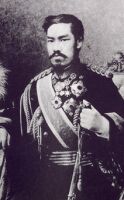 Emperor Meiji of Japan (currently in exile) |
| North American Powers | ||
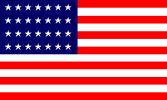 The United States of America | In the world of Castle Falkenstein, the USA hasn't been as successful as it has in our world. Western expansion has only been able to take the country as far as the east bank of the Mississippi River. This is because a combination of 17th century witch-hunting and the Masonic monopoly of magic within the US left the nation with a deficiancy of magic. On the other hand, the Indian shamans of the Twenty Nations Confederation and the voodoo priests of the Free State of Orleans have had enough power to hold their own against the technologically superior US Army. In spite of this, the US government clings doggedly to the doctirine of Manifest Destiny, and refuses to formally recognise any of the other nations between Canada and Mexico. The US is in the process of reconstruction following the Civil War, and retains the huge army it amassed during that conflict. President Grant, while a successful general, has been a poor president. The next election will be in 1876, and Grant is not expected to be nominated for a third term. |  President Grant of the USA |
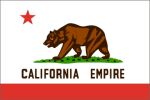 The Bear Flag Empire of California | The wealthiest of the North American nations, California reaches up the Pacific coast from Mexico to Canada. Emperor Norton I was once a harmless and well-loved San Fransisco lunatic, delusionaly convinced that he was an Emperor. By a strange series of events, he was made Emperor of California to fill the power vacuum left by the death of California's only president, Captain Fremont. Though highly eccentric, Norton is a just and capable ruler, who has managed to create an efficient, prosperous nation with a harmonious multi-ethnic populace. Of course, he has some excellent help; his Minister of War is the legendary Western hero Kit Carson, and his Prime Minister is Samuel Clemens, aka Mark Twain. |  Emperor Norton of California |
| South American Powers | ||
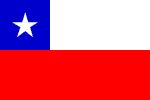 The Republic of Chile | Easily the most stable nation in Spanish America, Chile has been expanding gradually northward and southward from it's central valley since it became independent from Spain. At first, Chile was run by it's Basque-Castilian aristocracy, though the government was republican in form. In recent decades, however, the government has become substantially less aristocratic, though not much more democratic. Chile is a fairly wealthy nation, made so by it's natural resources and thriving merchant marine. While a many of the aristocracy see that wealth simply as a way to avoid being taxed, President Errázuriz has been using some of this money to extend railroads to the outlying areas of the country; to stage exhibitions of industry, art and agriculture; and to purchase modern ironclad warships from the British. In our world, the ironclads and the northern railroad proved particularly useful a few years later, when Chile went to war agains an alliance of Peru and Bolivia. The Peruvian fleet was convincingly defeated, and Chile annexed a large swathe of Bolivian territory. | 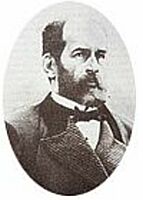 President Errázuriz of Chile |
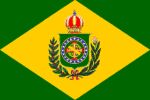 The Empire of Brazil | While the Spanish Empire in South America broke up into a number of seperate countries following independence, the Portuguese colonies in Brazil remained politically united. When they declaired their independence in 1822, they proclaimed the Portuguese crown prince, Dom Pedro, as Emperor of Brazil. Prefering to become the King of Portugal to Emperor of Brazil, he abdicated in favour of his son, Dom Pedro II, and returned to Brazil. Brazil has remained remarkably stable and fairly prosperous ever since then. This is not to say that all was well- slavery was, alas, alive and well until after the overthrow of the monarchy in the 1880s. Brazil also recently defeated Paraguay and Uruguay in the bloodiest and most brutal war to be fought in South America. | 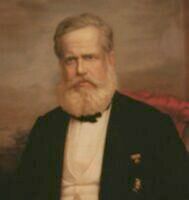 Dom Pedro II, Emperor of Brazil |